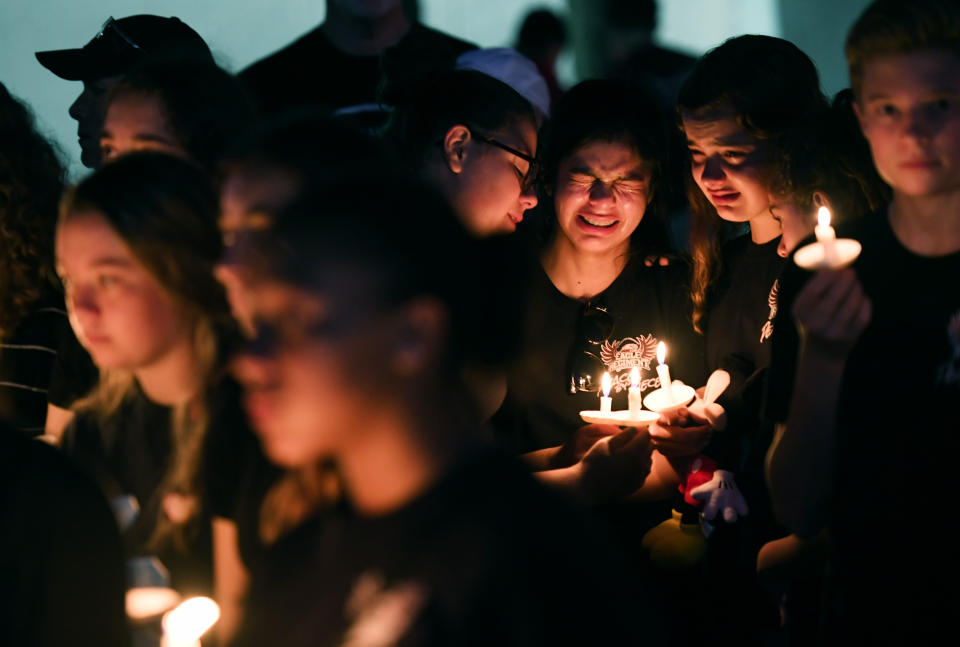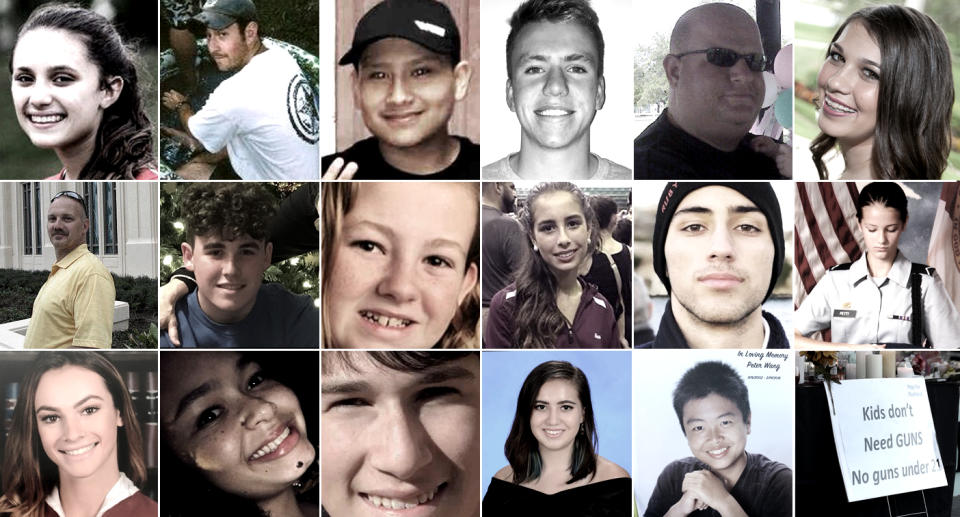After Parkland, a new generation uses its voice against guns

The first time it happened, we blamed the students. It was their generation’s fault, we the grown-ups told them — all that bullying, and goth culture, and nasty music with impolite lyrics. (The fact that most of that turned out not to have spurred the Columbine shooters never really changed the narrative.)
This time, in what might evolve into a new strategic direction for the gun control fight in the U.S., the students are blaming us.
“Please … we’re children. You guys are the adults,” said 17-year-old David Hogg, a survivor of the shooting at Marjory Stoneman Douglas High School in Parkland, Fla., on Wednesday, that left 17 dead, 15 more hospitalized, and a former student in custody. “My message to lawmakers and Congress is: Please take action,” he told CNN.
The distance between Columbine and Parkland is more than 2,040 miles, nearly 19 years, and a chasm of technology. There was no Twitter back then, no texting, no Facebook Live. There was also no feeling of numbing familiarity either, of having seen this 25 times before, which is the number of fatal school shootings between the two.
So while both massacres happened at high schools, to victims not yet old enough to vote, the thousands of students who survived the carnage emerged into different political worlds and seem to be taking on different advocacy roles. After Columbine, the talk among students was about prayer and healing and kindness. After Parkland, it is about anger and frustration — and gun control.
Slideshow: Mourning those lost in the Parkland school shooting >>>

Hogg, a student journalist, used the hour he spent hiding in a classroom to interview many of the 40 students who were crouched there with him. And they wanted to talk about guns. They did so thinking this might be their last message out. “I figured, if I died, at least this [the recording] would be passed on to other people, so these voices would echo on,” Hogg told the BBC when it was over.
“I personally have rallied for gun rights,” one young woman told him, then added, “This experience has definitely changed my viewpoint.” She said she’d planned to spend her 18th birthday at a gun range, but “at this point I don’t want to be behind a gun, I don’t want to be behind a bullet, because I don’t want to be the person to point a bullet at someone. To have the bullet pointed at me, my school, my classmates, my mentors, it’s definitely eye-opening to the fact that we need more gun control in our country.”
Once they were finally rescued by SWAT teams, the students kept sharing their thoughts, still using tools that their Columbine predecessors didn’t have and that the Sandy Hook victims were far too young to use.
Using technology as their megaphone, they brought the sounds and emotions of hunkering inside the building out to a wider world. Sam Zeif posted screenshots on Twitter of the text messages he shared with his younger brother Matthew, who was in hiding one floor above him.
Scariest part of it all was knowing my little brother was right above me and not knowing if I would ever see him again. I’ve never really treated him the way he deserved. Not anymore. Seeing his face outside of school was the most relief I had ever felt. My prayers to all. pic.twitter.com/Iq8CHVNXd0
— Uncle Sam Zeif (@SzZeif) February 15, 2018
“Are you okay?”
“Just know I love you”
“I love you too”
“forever and you’re the best brother”
“my teacher died and he’s sitting in the doorway”
They also used their screens to push back against those in power.
When Donald Trump tweeted his “prayers and condolences” to the victims’ families, for instance, student Morgan Williams tweeted back: “Unless you are going to do something about gun control so no one else experiences what my school has, shut the f*** up.”
Unless you are going to do something about gun control so no one else experiences what my school has, shut the fuck up. https://t.co/9i8Yr2233L
— Morgan Williams (@morganw_44) February 15, 2018
Later she also tweeted, “I cannot stop hearing the sound of the gun as he walked down my hallway. I cannot unsee my classmates who were shot get carried out by police. I cannot unsee the bodies on the floor. Please keep in mind the horror of what we’ve gone through today. #prayfordouglas”
Then she added: “Never in a million years did i think i would have EVER gone through this. There is NO reason why i should have had to run past deceased friends and classmates to get to safety because there isn’t a control on how easy it is to get a gun.”
Never in a million years did i think i would have EVER gone through this. There is NO reason why i should have had to run past deceased friends and classmates to get to safety because there isn’t a control on how easy it is to get a gun. #stonemandouglas #parkland
— Morgan Williams (@morganw_44) February 14, 2018
When Fox News contributor Tomi Lahren said on Twitter that the shooting “isn’t about a gun, it’s about lunatics,” senior Carly Novell tweeted back.
“I was hiding in a closet for 2 hours. It was about guns. You weren’t there, you don’t know how it felt,” she wrote. “Guns give these disgusting people the ability to kill other human beings. This IS about guns and this is about all the people who had their life abruptly ended because of guns.”
I was hiding in a closet for 2 hours. It was about guns. You weren’t there, you don’t know how it felt. Guns give these disgusting people the ability to kill other human beings. This IS about guns and this is about all the people who had their life abruptly ended because of guns. https://t.co/XnzhvuN1zd
— carly (@car_nove) February 15, 2018
And when Florida Sen. Marco Rubio took to the Senate floor to say that stricter gun laws would not have stopped the Parkland shooter, junior Cameron Kasky disagreed publicly. “The shooter is not the only one responsible for this tragedy,” he wrote in a CNN op-ed. “While the alleged shooter may have had several issues, he also lived in a society where Sen. Marco Rubio refuses to take responsibility for the role gun culture may have played in this tragedy.
“I’m just a high school student,” he continued, “and I do not pretend to have all of the answers. However, even in my position, I can see that there is desperate need for change — change that starts by folks showing up to the polls and voting all those individuals who are in the back pockets of gun lobbyists out of office.”
In the days since the shooting, they have not stopped speaking out. A student named Kyra, with the Twitter handle @longlivekckx, responded to those who thought she should “pipe down”:
“For those in my mentions, telling me to shut up, telling me I don’t know what I’m talking about,& many other things. Know that I stand my ground, as a douglas student. A student who’s lost classmates, friends and coaches. For the rest of my life I will demand change.”
The students quickly moved from describing their experiences to organizing for reform. Hogg tweeted: “To the Americans out there who ask what they can do there’s a lot but start out by finding out who your districts congressman is and your state legislators are call them, visit them, write letters, and make your voice heard because an uneducated democracy is a broken democracy.”
To the Americans out there who ask what they can do there’s a lot but start out by finding out who your districts congressman is and your state legislators are call them, visit them, write letters, and make your voice heard because an uneducated democracy is a broken democracy.
— David Hogg (@davidhogg111) February 16, 2018
Kasky, who says he feels a “calling” to support gun control legislation, made a similar plea. On Facebook, he launched the #NeverAgain campaign to push the election of politicians who will vote for new gun control measures.
And elsewhere on that social network there is a push for a #nationalschoolwalkout. Those who created the Facebook page say they are working with the organizers of the Women’s March to schedule a day when students, teachers, parents and allies will walk out of schools nationwide to demand an end to gun violence.
Will any of this change American laws? There have been other coalescing moments that seemed poised to bring tighter gun control, like when the grieving parents of Sandy Hook victims went door to door on Capitol Hill. But even after that, Congress did not approve new limits on assault weapons.
On the other hand, there is one way in which this is different. Like the youth of the 1960s who understood the use and power of television better than their elders (and used it to help speed the end of the Vietnam War), today’s digital natives speak the language of virality and memes in a way that the organizers of groups like Sandy Hook Promise and Everytown and the Brady Foundation — and even the NRA — simply do not. Political donors on both sides have seen the value of viral memes and are funding groups to create them.
As Wired magazine contributing editor Virginia Heffernan noted in a tweet that was liked 12,000 times in three hours:
“These brave Parkland students are doing something astonishing. They are instantly preempting disinfo & gaslighting by posting testimony, evidence, photos. And they have rallied to specifically oppose the NRA. This is courageous grieving; they are warriors fighting for all of us.”
It just might be that these latest victims will be the ones to mobilize a weapon that is the opposite of a gun — their collective voice.
Slideshow: Remembering the victims of the Parkland, Fla., high school shooting >>>

_____
Read more from Yahoo News:

